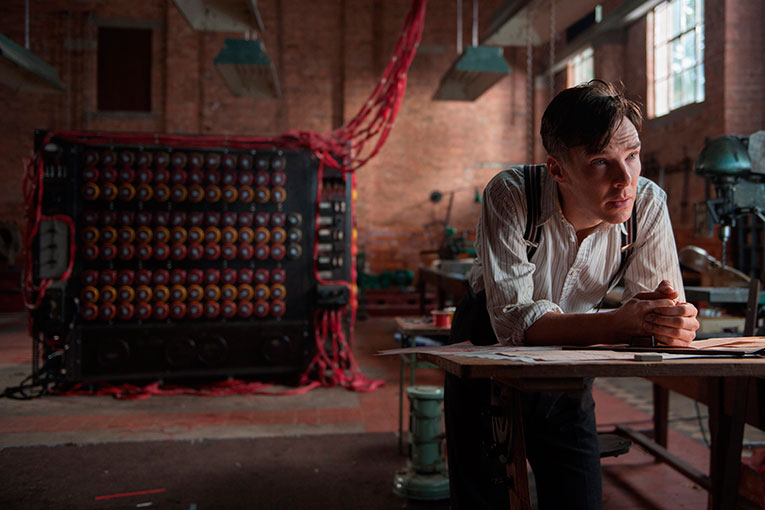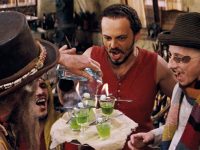
 The Weinstein Company / Black Bear Pictures / Ampersand Pictures The Weinstein Company / Black Bear Pictures / Ampersand Pictures |
||
|
The Imitation Game did not go unnoticed when it premiered in Spain in early 2015. The film chronicles the life of Alan Turing, played by actor Benedict Cumberbatch, and was directed by Morten Tyldum. This biopic, based on the biography written by Andrew Hodges, The Enigma (Burnett Books, 1983), was nominated for eight Oscar Awards and won one, best adapted screenplay. Previously, it had been nominated to the Golden Globes and the Critics’ Choice Awards, among others. But faced with these cinematographic merits and honours, there was no shortage of other voices, from experts and relatives of Turing, who criticised the film. For instance, journalist Alex von Tunzelmann from The Guardian accused Morten Tyldum of «inventing a new slander to insult Alan Turing». John Graham-Cumming was also unhappy and said he felt disappointed by the film because he knew much about the real historical facts and some of them had been changed. He was the computer programmer who got Gordon Brown, on 10 September 2009, to apologise publicly on behalf of the British Government for how they treated Turing, who was convicted in 1952 for being homosexual. Four years later, on 24 December 2013, Queen Elizabeth II granted a Royal pardon to Turing for «a sentence we would now consider unjust and discriminatory», as announced the Justice Minister Chris Grayling. |
«Faced with these cinematographic merits and honours, there was no shortage of other voices, from experts and relatives of Turing, who criticised the film» |
|
 Hoja de Router Hoja de Router Fragment of the public apology to Alan Turing, written on 10 September 2009 by Gordon Brown, Prime Minister of the UK at the moment. |
||
|
From the Person to the CharacteR We talked about the image of Alan Turing and its portrayal in Morten Tyldum’s film with Pedro Ruiz-Castell, Physicist and PhD. in Science History. Ruiz-Castell, who is also a researcher at the López Piñero Institute for the History of Science and Medicine, claims Alan Turing was «one of the most important and influential minds of the twentieth century. Yet, despite his important contributions, derived from his theoretical model of a universal machine, the figure of this forefather of modern computer science «was despised and neglected for years». In this context, the film can be a first approach to him, but Ruiz-Castell warns us that «the script constructs a character, turns Alan Turing into a caricature, the stereotype of the tormented genius, which reminds of other scientists we have seen on our screens, with obsessive behaviour bordering on autism». Rather on the contrary, Ruiz-Castell tells us that «Turing did not have any sociability problem and was perfectly integrated with his colleagues, who highlighted his great sense of humour». |
«The film can be a first approach to him, but the film ends up creating a character, turning Turing into a caricature» |
|
 The Weinstein Company / Black Bear Pictures / Ampersand Pictures The Weinstein Company / Black Bear Pictures / Ampersand Pictures |
||
|
Although the film is, in principle, based on Hodges’s biography, many elements do not coincide with reality. Ruiz-Castell mentions, for instance, that «the idea that Turing’s invented and physically constructed the machine that decoded the messages of the Germans after a couple of years of unsuccessful work is false. Based on a model of electro-mechanical machine previously developed by the Polish intelligence, the machine he designed in order to decode the messages generated by the German Enigma machines, named Bombe, was built by the British Tabulating Machines company in 1940». Turing’s team is not portrayed properly either. Hugh Alexander, chess champion, did not start working with Turing immediately and Joan Clarke was not recruited with a crossword competition, but through her academic tutor, Gordon Welchman – who is not even in the film. And there is nothing but fiction in the open confrontation between Commander Alastair Denniston and Turing. Versions and distortionS Beyond small film licenses, there are distortions in the story that can turn into «really offensive accusations» towards Alan Turing, Ruiz-Castell indicates: «The dramatic scene in which they sacrifice the ship with Peter Hilton’s brother so as not to reveal their decodification to the Germans is completely made up. It is not true either that the Russian spy John Cairncross was part of Turing’s team, nor that he was blackmailed». This would turn Turing into a coward and a traitor. Similarly, it is not true either that the police though Turing was a spy and his sexual orientation was discovered due to the investigations. «It was all the result of an affair between Turing and a young man with economic needs named Arnold Murray. Turing blamed him for a burglary at home and Arnold finally acknowledged that a friend of his was responsible for it. The research carried out by inspectors after Turing’s report ended up with the indictment of Alan Turing for a crime against public moral due to his sexual relations with other men. In order to avoid going to prison, Turing declared himself guilty and underwent oestrogen treatment to “cure” him of his condition.» The treatment worked as a chemical castration. |
«If they wanted to pay tribute to Alan Turing, I do not think lying is the best way to do it. Specially when there are so many inaccuracies and slander» (Pedro Ruiz-Castell) |
|
 The Weinstein Company / Black Bear Pictures / Ampersand Pictures The Weinstein Company / Black Bear Pictures / Ampersand Pictures |
||
|
On the possible benefits of the relationship between science, history and cinema, specially for blockbusters, Ruiz-Castell thinks that «there may be a positive effect for Science History and science communication, but probably not distorting history like that…». Thus, although The Imitation Game might have been conceived as an homage to an unfairly forgotten and abused scientist, «if they wanted to pay tribute to Alan Turing, I do not think lying is the best way to do it. Specially when there are so many inaccuracies and slander. In fact, it would not be necessary to distort his life to obtain a film as interesting or more than this one». And, like Turing, there have been many figures in history, particularly scientists, who have been unfairly ignored, despised and vilified. «Maybe the recovery of Nikola Tesla in recent years could also be framed within the rehabilitation of people who did not get the recognition they deserved». While we talked about – individual – men like Alan Turing or Nikola Tesla, women – collectively – with very important contributions to the development of scientific knowledge have traditionally been ignored and undervalued. Faced with this situation, The Imitation Game has missed another chance to showcase their contribution to the development of science and technology. Around 9,000 people worked in Bletchley Park, 6,600 of them were women. «The machines designed to decipher codes were soon on the hands of young women, many of them from high-class families, who volunteered for the project. Mixed-gender workplaces were generalised during the war in virtually every sector, including science and technology. But not even Joan Clarke was properly represented, although she could have portrayed the academic value of many women who were recruited due to their ability and who notably contributed to the production of scientific knowledge». |
«The Imitation Game missed another chance to showcase women’s contribution to the development of science and technology» |
|
 Brian Sweeney / The Telegraph Brian Sweeney / The TelegraphApproximately 6,600 of the 9,000 people working to decipher the Enigma code were women. On the picture, some of the workers at Bletchley Park. |
||
|
The film, however, misses also the opportunity to deal with other topics, such as homosexuality, in a much more natural way. «As some critics have pointed out, the film wants to turn Alan Turing into a token of the gay liberation movement. Yet the film does not show him kissing another man, or frequenting cruising bars in New York, or visiting one of the ’disreputable’ Greek islands, as Turing did. Maybe they have distorted reality in order to construct an extremely decent and politically correct myth?», asks Ruiz-Castell. Despite everything, the film works: «It is interesting, entertaining and funny, thrilling and very well interpreted». It even makes an interesting contribution to the presentation, not so much the communication, of Alan Turing for a wider audience, as well as some of the essential contributions to the development of World War II and modern computer science. «However, if you really want to learn more about Turing, as almost always, there is nothing better than a good book». In this case, it could very well be the biography written by Andrew Hodges. And to learn about the forgotten Women Codebreakers at Bletchley Park, the book by the researcher Kerry Howard. Íngrid Lafita. Journalist. Mètode Science Studies Journal, University of Valencia. |
«The film misses also the opportunity to deal with other topics, such as homosexuality, in a much more natural way» |
|
| Related articles: A mind’s enigma |
||





